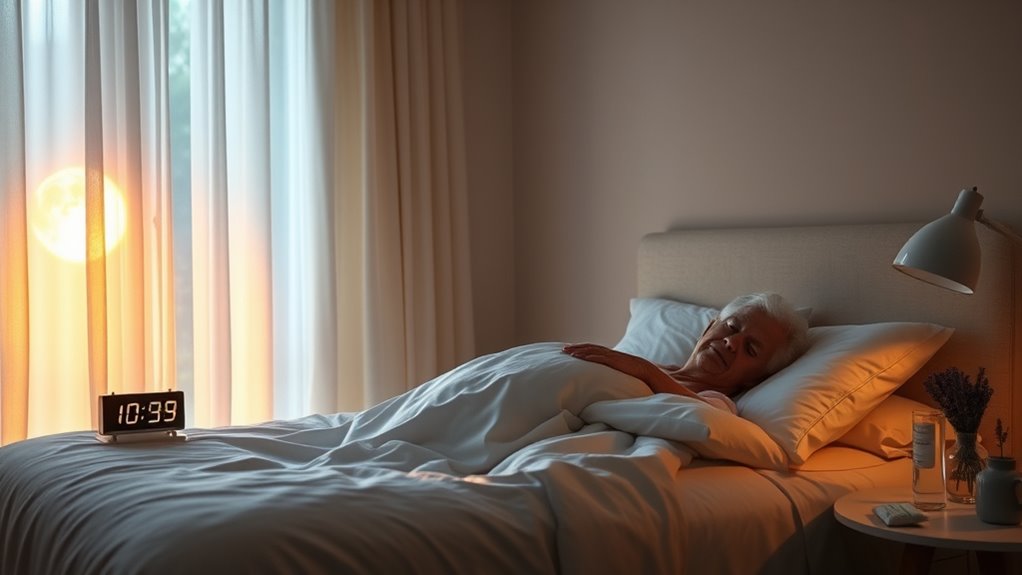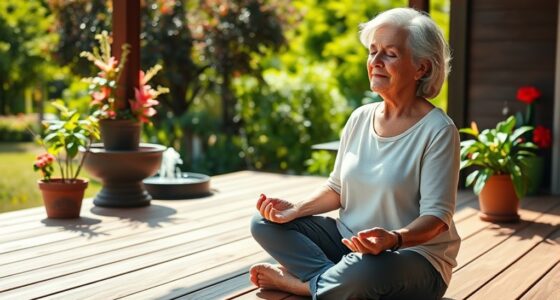As you age, good sleep hygiene becomes even more important because natural changes in your sleep patterns and circadian rhythms can lead to fragmented sleep and daytime tiredness. Staying consistent with your routines, creating a relaxing environment, and getting regular sunlight help support healthy sleep. Prioritizing habits that promote restful sleep can boost your immune system, mental sharpness, and emotional well-being. If you want to discover more ways to improve your sleep as you age, keep exploring.
Key Takeaways
- Aging causes natural sleep disruptions, making good sleep hygiene essential to maintain health and well-being.
- Circadian rhythm changes with age require consistent routines to support restful sleep.
- Older adults are more vulnerable to the negative effects of poor sleep, such as cognitive decline and weakened immunity.
- Creating a sleep-friendly environment becomes increasingly important to combat fragmented sleep patterns.
- Prioritizing sleep hygiene helps mitigate age-related sleep issues and promotes overall vitality and resilience.

As we age, maintaining good sleep hygiene becomes increasingly essential for overall health and well-being. Sleep quality tends to decline with age, and this can have a significant impact on your physical health, mental clarity, and emotional stability. One of the key factors influencing sleep quality in older adults is the natural shift in circadian rhythms—the internal biological clock that regulates sleep-wake cycles. As you get older, these rhythms often become less synchronized with the external environment, leading to earlier bedtimes and wake times, fragmented sleep, and difficulty falling asleep or staying asleep.
Understanding the role of circadian rhythms helps you appreciate why establishing consistent sleep habits is crucial. When your internal clock is out of sync, you may find yourself waking up multiple times during the night or feeling tired during the day, which affects your overall sleep quality. To support healthy circadian rhythms, it’s important to create a routine that aligns with natural light exposure. For example, getting sunlight in the morning can help reset your internal clock, encouraging more restful sleep at night. Conversely, reducing exposure to bright screens and artificial light in the evening signals to your body that it’s time to wind down, promoting better sleep and helping to regulate your circadian rhythms.
Supporting circadian rhythms with light exposure promotes restful sleep and overall health.
Good sleep hygiene isn’t just about timing; it also involves creating an environment conducive to quality sleep. Keep your bedroom cool, quiet, and dark to minimize disruptions. Establish a pre-sleep routine—such as reading, gentle stretching, or meditation—that signals your body it’s time to relax. Avoid caffeine, heavy meals, and alcohol close to bedtime, as these can interfere with your sleep quality and disrupt your circadian rhythm. Regular physical activity during the day can also enhance sleep, but try to avoid vigorous exercise close to bedtime, which might make falling asleep harder. Additionally, understanding Gold IRA Rollovers can help diversify your long-term financial health, so considering investments that hedge against inflation is beneficial for overall stability.
As you age, it’s crucial to prioritize sleep hygiene because disrupted sleep can lead to more serious health issues like weakened immune function, cognitive decline, and increased risk of chronic diseases. By paying attention to your sleep environment, maintaining a consistent schedule, and supporting your circadian rhythms, you give yourself the best chance for restorative sleep. This, in turn, helps you feel more energized, alert, and healthier overall. Good sleep becomes a cornerstone of aging gracefully, allowing you to face each day with vitality and resilience.
Frequently Asked Questions
How Does Sleep Hygiene Impact Cognitive Decline in Older Adults?
Good sleep hygiene directly impacts your cognitive health by improving sleep quality, which is essential for brain health. When you maintain a consistent sleep schedule and create a restful environment, you support memory, focus, and mental clarity. Poor sleep, on the other hand, accelerates cognitive decline over time. So, taking steps to enhance your sleep habits helps protect your brain and keeps your mind sharp as you age.
What Are the Best Sleep Hygiene Practices for Seniors With Chronic Illnesses?
You should prioritize creating a comfortable sleep environment by keeping your room cool, dark, and quiet. Incorporate relaxation techniques like deep breathing or gentle stretches before bed to ease your mind. Avoid caffeine and heavy meals close to bedtime, and stick to a consistent sleep schedule. These practices help manage symptoms of chronic illnesses, improve sleep quality, and support overall health as you age.
Can Improving Sleep Hygiene Reduce Medication Dependence in Aging Populations?
Improving your sleep hygiene can markedly boost your sleep quality, which may lead to medication reduction in aging populations. When you establish consistent sleep routines, limit caffeine and screen time before bed, and create a restful environment, you help your body naturally restore itself. Better sleep helps manage symptoms better, potentially reducing your reliance on medications. This approach promotes healthier aging and enhances overall well-being.
How Do Sleep Patterns Change Biologically as We Age?
As you age, your sleep patterns change due to biological shifts like circadian shifts and hormonal fluctuations. Your internal clock, or circadian rhythm, tends to delay, making you feel sleepy later and wake up later. Hormonal fluctuations, especially decreases in melatonin and growth hormone, can also disrupt your sleep cycles. These changes often lead to lighter, more fragmented sleep, making it harder to stay rested and alert during the day.
Are There Specific Sleep Hygiene Tips for Older Adults With Mobility Issues?
Think of your sleep as a delicate garden that needs nurturing. With mobility issues, you should invest in adaptive bedding to make getting in and out easier, reducing frustration. Gentle mobility exercises before bed can calm your mind and body, encouraging restful sleep. Keep your bedroom cozy and clutter-free, creating a peaceful oasis. These simple tips help you enjoy better sleep and wake up refreshed, no matter your mobility challenges.
Conclusion
As you age, maintaining good sleep hygiene becomes your anchor in a stormy sea, guiding you toward calmer nights and brighter days. Like a lighthouse standing firm against the darkness, your habits can illuminate your path to restful sleep. Remember, each mindful step you take today builds a sturdy bridge over the restless waters of aging. Embrace these habits now, and watch as they transform your nights into peaceful havens, shining brightly through the years.









